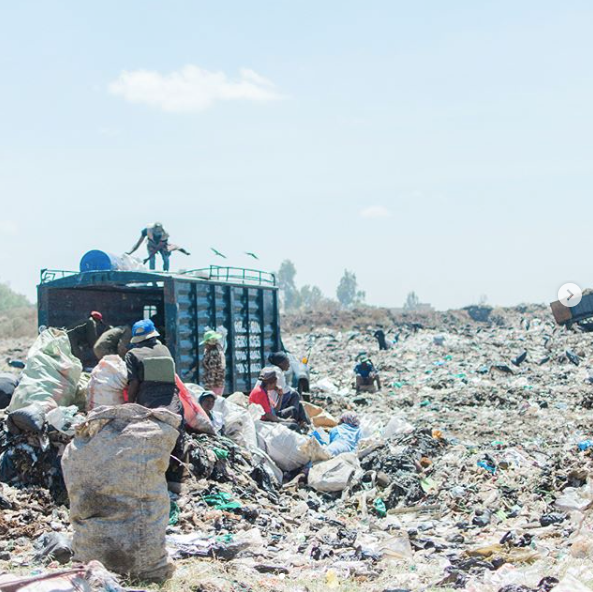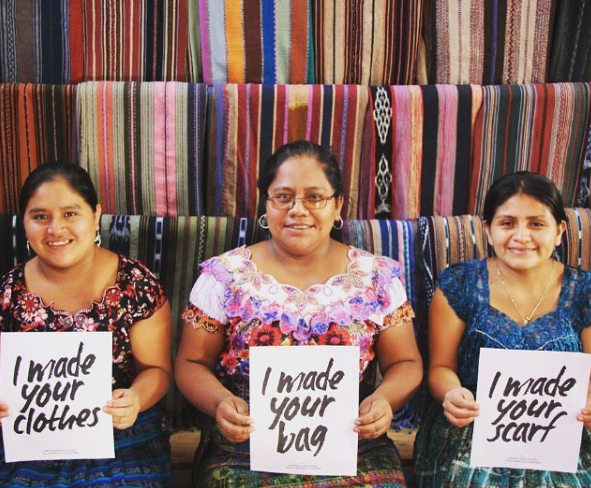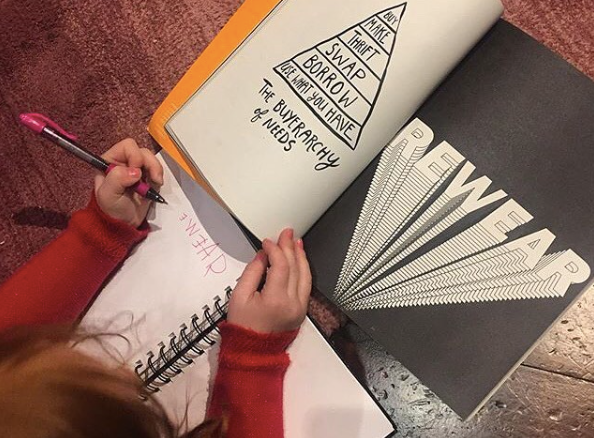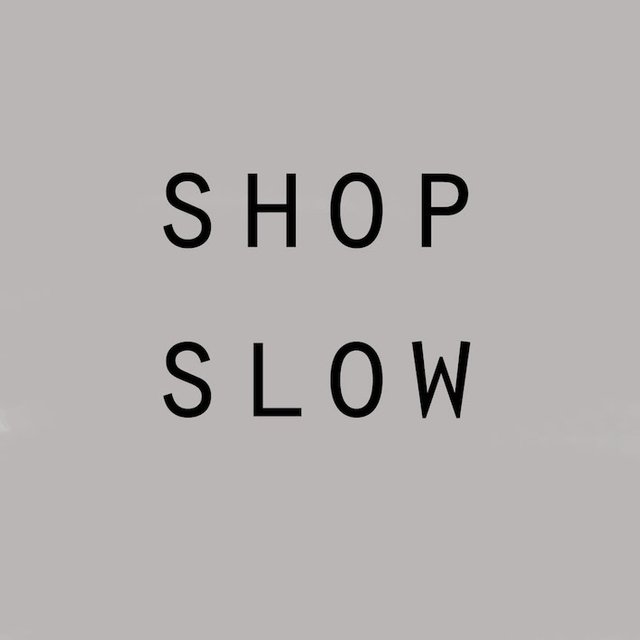As I've mentioned previously, I own the small, slow fashion label, HUX. Over the past few years many people have questioned what slow fashion actually is, so I’m here to help clarify what slow fashion actually means and what you can do to change the way you, as a consumer, can help to change the fashion industry.
Let’s start with Fast Fashion
In order to understand slow-fashion, we first need to understand the term fast fashion (or unfortunately, known as just fashion).
Fast fashion refers to two things, the way fashion items are produced and the way in which they are consumed.
Production
Products are mass produced, using cheap labour and usually unethical working conditions to produce ‘on-trend’ fashion pieces as speedily as possible to stay in line with the fashion dictations of the moment. Most of the designs are replicas or modified version of catwalk items. Because of the way the ‘design process’ works, there is a high turn over of designs and a result also a high volume of wastage.
Consumption
My generation will not settle for anything that is not instantaneous. And how can we begin to try and live otherwise, when we live in a world of instant gratification. Technology at our finger tips, a world on tap. The same goes for the way we shop. We are so used to going online and purchasing cheap clothing and receiving it the very next day, only to wear it once and damage it. We don’t mind because it was only £9.99 and did the job of making us seem insta-perfect last Saturday night. We tend to over-consume because prices are cheap and trends change like the wind. And that right there is fast fashion.

image via @fash_rev
"According to a report by Value Village, 10.5 million tons of clothing is sent to landfill every year in North America alone." - via Fash_Rev
To recap fast fashion doesn’t only refer to the fact clothing and accessories are produced using fast-factory methods, but also the fast method in which these items are being consumed.
So what is Slow Fashion?
At the moment slow fashion is seen more as a movement, since fast fashion is the norm, but hopefully in the future it will come to be the norm.
Production
Slow fashion is the opposite of fast fashion. It means producing fashion items using slow-methods of production, usually in workshops, rather than factories, and usually hand-crafted, rather than mass produced. The designs are usually limited only to the designer, rather than being replicas of catwalk designs and the brands who are championing slow fashion usually operate in a transparent way.
It’s worth highlighting that slow fashion actually means a slower production time too, which can often be frustrating to consumers and suppliers, who are used to seeing production churned out in just a few weeks. At HUX we work directly with the artisans to produce our one-of-a-kind designs and working in this way means heavy delays when it comes to production. If one of the artisans falls sick, for example, the entire production line is delayed. Therefore there are a lot of challenges around managing the manufacturing process not only for HUX, but for most of the slow-fashion brands we know.
Consumption
And consumption is directly affected along with that since customers who shop slow also show less. Through branding, we can educate our customers into making deliberate choices to shop less and invest in higher quality products which last. Generally speaking, there is a reason why something that is mass produced and sold for cheaper than a glass of wine, won’t last you very long when it comes to durability.
How bad is the Fashion industry as it stands?
Bad. After the Oil & Gas industry, the Fashion industry is thought to rank second in the top industries which are negatively impacting the planet. Although that is just speculative since it has been misquoted many times and is very difficult to calculate the impact each industry has on the planet. What we do know is
“Fashion is one of the most resource-intensive industries in the world, both in terms of natural resources and human resources.” - Jason Kibbey, CEO of the Sustainable Apparel Coalition
Over the last few years there has been a lot of awareness around this and a call for fashion labels to be much more transparent in the way in which they operate.
Why is the fashion industry so bad?
Not just the use of large, and polluting factories as some of you may think. Way beyond that is the heavy use of water. The facts and figures differ tremendously when confirming how much water is used to produce one t-shirt so I won't write a figure here, but it's a staggering amount. The use of water is mainly for cultivating cotton (and various other soon to be materials) and also the water involved in the dying process. Along with this textile wastage every year is huge because of the changing fashion trends, with many people discarding items after just a few wears - only to be sent to landfil.
All of these factors contribute to the negative impact the fashion industry is having on the rest of the world.
Why shop slow fashion?
Slow fashion isn’t just about saving the planet and reducing textile wastage. By shopping slow-fashion brands who operate in a transparent way, you are contributing to supporting the lives of the artisans who craft the products. By supporting these brands you will also be contributing towards a positive shift in the fashion industry as a whole by shaking up the conversation further and forcing labels to re-examine their entire production lines.

image via @fash_rev
What can you actually do to make a difference?
I’m pretty fed up of people who tell you all the bad things about the world, but don’t guide you into knowing what you can do better to avoid being a part of the problem (Leonardo DiCaprio i'm looking at you and Before The Flood (rolls eyes)). I do understand that shopping with slow fashion brands can often be more expensive. I am not suggesting that you throw all your clothes away and switch your wardrobe to a slow-fashion only brands. In fact that’s the exact OPPOSITE of what you should do. Keep what you have, adore it, up-cycle in some way to fit your new vibe. And then when you decide you need more clothes, perhaps you can try the following things:

image via @fash_rev
1. Shop in second hand stores. If, like me, you don’t like looking like everyone else, then shop second hand fashion items and reinvent them into something new or timeless. A pair of scissors can really do wonders. Change those pre-loved wears into re-loved ones!
2. Make your own clothes. Sounds nuts, right? Actually I think you’ll be surprised how easy it is to make something loose like a kaftan (minimal stitching involved). Or even change up old clothes. If you do want try and stay on trend then don't BUY those ripped jeans! Rip up some perfectly good old ones.
3. Shop with transparent, slow-fashion brands. Not all of them are crazy expensive either, sure the prices are higher than your fast fashion hughstreet chains, but HUX and other brands are trying to make slow fashion more affordable for people. Shopping this way will also encourage you to shop less and to shop in a more sustainable, meaningful way.
Try to be more patient with the smaller, slow fashion brands because, as mentioned previously, production won't happen over-night like it can with fast fashion.You don’t have to shop fancy designers, you can head to small, local brands. Which leads me onto my next point.
4. Shop local. Yep, just like fruit and veg. I think you may be surprised to know how many brands are home-grown in homes near where you live! It may sound improbable, but look into it. It may surprise you. Needless to say it's much better for the environment.
5. Shop less. This one is a bit harder, because with the influence media has over us, it's difficult to make informed choices about our own style. I try to shop for classic items that I know I can dress up or down which will last me years. That way I can shop less. Oh and it's cheaper too!
6. Question fashion brands. Don't be afraid to ask questions about how the products you are purchasing are made and where they are made before you make a choice about whether you want to support their brand.
I hope this gives you a better understanding of slow fashion and what you can do to shop in a more mindful, impactful way.
*if you have any content which could be relevant to Small Business Owners, or would like advice yourself then use the tag #sbo as well as 'business' so we can connect more easily!
Yasmine

I agree with our generation, wants things instantaneous and companies do things to feed that habit. However my main gripe is that slow fashion is quite expensive, your label is one of those rare ones that are quite hard to find, but it is within the budget.
Returning back to my main point, if everything is so instantaneous, why would people want to find rare brands like yours cheap and hand crafted. When they can pay more and get it instantaneous.
It comes back to convenience and I think that’s more important to people, than money or quality.
Downvoting a post can decrease pending rewards and make it less visible. Common reasons:
Submit
Understand your point here and actually I thought that way before I joined the fashion industry. This article is designed to provide a very, very, basic understanding on what Slow Fashion actually is.
The wider goal is to educate people on why hand crafted products are better. Sure, you can buy something that's fast fashion for the same price. It's just like saying why should I eat a healthy home cooked nutritious meal when I can eat a hamburger? I can get it faster and it will fill me up just the same. So i disagree with you here and I don't think convenience is as important to people as quality. Perhaps right now, yes, since this isn't something that we are discussing every single day. But as the conversation becomes louder, there will be a shift. Just as there has been in the food industry. In fact the fashion industry has already made incredible changes which are already impacting High Street Brands.
Thank you for taking the time to comment on this. This is something I love to discuss and always enjoy hearing different perspectives :-)
Downvoting a post can decrease pending rewards and make it less visible. Common reasons:
Submit
Your welcome,
But the shift in the food industry I think can be thankful towards body image and how the media, fashion industry and entertainment industry places a heavy fact on body image and how you need to be this size to look good or be attractive. That probably was a catalyst to drive people to be more healthy.
To be a bit more clear: I guess it comes down to the individual whether you want convenience or quality.
Downvoting a post can decrease pending rewards and make it less visible. Common reasons:
Submit
Great post, Yas and I'm with you on buying less but higher quality and more sustainable clothing going forward.
I also think one of the biggest advantages of slow fashion brands is transparency and they should all use it as much as possible in their marketing and messaging. Showing the exact process, materials and manufacturers who made the item - making it much easier to connect with the brand on the emotional level (rather than treating it as a commodity).
Great summary and I'm so proud of what you've achieved with the HUX label already. Keep taking over the world with slow fashion! X
Downvoting a post can decrease pending rewards and make it less visible. Common reasons:
Submit
So true, Inga. Thanks for your feedback and constant support! Really appreciate you!
Downvoting a post can decrease pending rewards and make it less visible. Common reasons:
Submit
Also just thinking about it.. you have always been so good with clothes. You make them last a really long time and take great care of them! Even when we were younger.
Downvoting a post can decrease pending rewards and make it less visible. Common reasons:
Submit
Haha true but then I've also bought so many clothes that I've worn only once or twice and I don't really want to throw them away because they're in such a good condition.
Maybe we could do a crafts session when you're back and see if we can turn them around somehow? Haha :-)
Downvoting a post can decrease pending rewards and make it less visible. Common reasons:
Submit
Definitely! I'll help you upcycle them all! I've turned some t-shirts into crop tops recently. Not that i'll be able to wear them in London! Bloody snowing!!!
Downvoting a post can decrease pending rewards and make it less visible. Common reasons:
Submit
Haha, festivals maybe? But yeah, I'm up for a creative prosecco filled Sunday when you're back here!
Downvoting a post can decrease pending rewards and make it less visible. Common reasons:
Submit
Hmmm. This is so true. Slow fashion would only be a movement bcos of the fast paced lifestyle we live these days. That doesn't stop us from preaching it though.
Downvoting a post can decrease pending rewards and make it less visible. Common reasons:
Submit
Couldn't agree more!!
Downvoting a post can decrease pending rewards and make it less visible. Common reasons:
Submit
First thing I read on your blog and it resonates with me so much! Happy we had a chance to meet and start the conversation 🙏
Downvoting a post can decrease pending rewards and make it less visible. Common reasons:
Submit
Happy to hear that, Vika! X
Downvoting a post can decrease pending rewards and make it less visible. Common reasons:
Submit